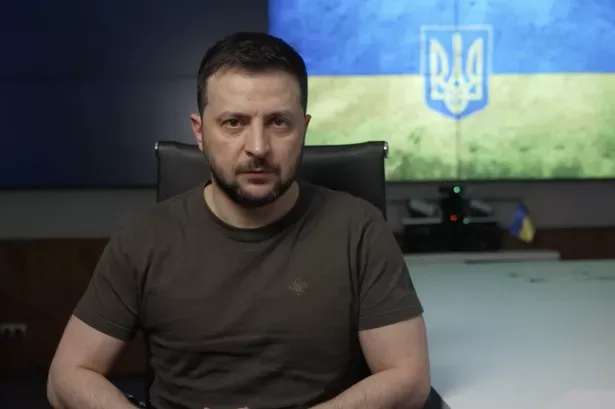In a significant shift in international dynamics, Ukrainian President Volodymyr Zelenskiy announced that his country’s defense partnerships would need to adapt due to North Korea’s alleged involvement in supporting Russian forces. North Korea has reportedly been transferring not only weapons but also personnel to aid Russia’s war efforts in Ukraine. This development has raised concerns and prompted a reevaluation of Ukraine’s strategic approach with its global allies.

During his nightly address, Zelenskiy expressed his concerns about the growing alliance between Russia and North Korea, stating, “We see that the alliance between Russia and such regimes as the North Korean one is getting stronger.” This alliance, according to Zelenskiy, extends beyond mere arms transfers, involving North Korean soldiers being sent to support Russian military operations. He emphasized that the evolving nature of these threats requires Ukraine’s defense strategy to undergo changes.
Zelenskiy highlighted the need for more comprehensive support from Ukraine’s allies, pointing out that Ukraine’s armed forces need more than just standard military equipment. “This is not just about the transfer of weapons; this is, in fact, about the transfer of people from North Korea to the armed forces of the occupiers,” he stated. As a result, Ukraine is now pushing for more advanced military capabilities, particularly long-range weaponry, and a steady flow of supplies to strengthen the front lines.
South Korea, a key observer in this unfolding situation, also voiced its concerns. South Korean Defense Minister Kim Yong-hyun stated that there was a “high possibility” that North Korea could be sending troops to assist Russia. Kim made this statement during a parliamentary hearing, further adding weight to reports that North Korean military officers had been killed in Ukraine as a result of a strike by Ukrainian forces. The minister’s words suggest that North Korea’s involvement may be more extensive than initially thought.
While South Korean officials appear convinced of North Korea’s involvement, the Kremlin has firmly denied these allegations. Russian spokesperson Dmitry Peskov was quick to dismiss the claims, labeling them as “another bit of fake news.” However, given the increasingly complex web of alliances and accusations, such denials have done little to quell speculation and concern over North Korea’s role in the conflict.
The possibility of North Korean personnel on the ground in Ukraine represents a new and troubling dimension to the ongoing war. Should these reports be confirmed, it would signal a broader international involvement in the conflict, further complicating diplomatic efforts and shifting the balance of power. The consequences of such involvement could lead to more profound international interventions and restructured alliances, both for Ukraine and for countries like South Korea that are monitoring North Korea’s actions closely.
Zelenskiy’s call for enhanced support from Ukraine’s defense partners underscores the urgency of the situation. “It is obvious that under such conditions our relationship with our partners needs to evolve,” he said, stressing that Ukraine’s military requires more than just weapons but a sustained and more substantial level of assistance to counter these emerging threats.
As the war continues, Ukraine’s leadership is bracing for new challenges on the battlefield, particularly if North Korea’s involvement proves to be substantial. With Zelenskiy’s appeal for stronger defense relationships and more advanced military aid, Ukraine’s future in the conflict depends heavily on how quickly its allies can respond to these evolving dynamics. The world watches closely as this alliance between Russia and North Korea unfolds, leaving many to wonder how deeply these new developments will affect the broader war effort.
In conclusion, the alleged support from North Korea to Russia marks a turning point in the Ukraine conflict. As alliances shift and new threats emerge, Ukraine is poised to recalibrate its military and diplomatic strategies in response to the growing complexities of the war. With both Russia and Ukraine receiving support from powerful international players, the outcome of this war is becoming increasingly difficult to predict. However, one thing is clear: Ukraine is preparing for a long and challenging battle ahead, one that will require more than just resilience—it will demand unprecedented levels of international cooperation and support.




GIPHY App Key not set. Please check settings